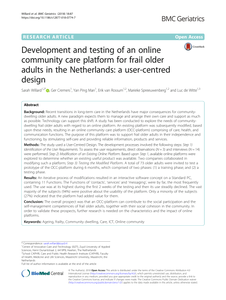Background: Due to demographic transitions and budget restraints, it is now necessary to search for comprehensive new strategies, in order to constitute a sustainable healthcare system. Recently, various online care platforms for community-dwelling older adults were introduced in several European countries. These platforms have aimed at solidifying social cohesion in the community, so as to support the older adults in coordinating or managing their care and to enhance the self-reliance of these older adults. Consequently, these platforms might contribute to a more sustainable healthcare system. The main research question of this study was twofold: Which online care platforms for older adults are available in the Netherlands and what are their characteristics? Methods: The researchers have performed a scoping review of the online care platforms in the Netherlands, according to the six steps of Arksey & O’Malley (2005), which were as follows: (1) Identifying the research question; (2) Identifying any relevant studies; (3) Selecting the studies; (4) Charting the data; (5) Collating, summarising and reporting on the results; together with (6) consultations with the relevant stakeholders. The study searched for evidence in online scientific databases (Phase 1) and on the Internet (Phase 2). The relevant studies that were published between February 2012 and October 2017 were included. Results: The review resulted in an overview of 21 care platforms, for which 3 types were identified: (1) Community Care Platforms; (2) Care Network Platforms; and (3) System Integrator Platforms. Conclusion: This typology of platforms can guide users – for instance, older adults, care professionals, informal caregivers and municipalities, in choosing a suitable care platform, i.e. the typology gives users insight into the functionalities, goals and target groups which allows them to choose a platform that matches their needs. As far as the authors know, no studies have previously reported on the effects of the online care platforms for older adults in the Netherlands, so further research is required on their impacts and on their benefits.
DOCUMENT

In dit proefschrift worden de resultaten beschreven van een studie die online wijkplatformen voor thuiswonende ouderen evalueert die werden ontwikkeld op basis van wensen en behoeften van eindgebruikers. Middels deze online wijkplatformen worden ouderen gestimuleerd om maatschappelijk te participeren en wordt gepoogd om in wijken vraag en aanbod van inwoners bij elkaar te brengen. Via deze online platformen kunnen wijkbewoners, zo ook thuiswonende ouderen, verschillende applicaties raadplegen.
DOCUMENT

Background: Recent transitions in long-term care in the Netherlands have major consequences for community- dwelling older adults. A new paradigm expects them to manage and arrange their own care and support as much as possible. Technology can support this shift. A study has been conducted to explore the needs of community- dwelling frail older adults with regard to an online platform. An existing platform was subsequently modified, based upon these needs, resulting in an online community care platform (OCC-platform) comprising of care, health, and communication functions. The purpose of this platform was to support frail older adults in their independence and functioning, by stimulating self-care and providing reliable information, products and services. Methods: The study used a User-Centred Design. The development processes involved the following steps: Step 1) Identification of the User Requirements. To assess the user requirements, direct observations (N = 3) and interviews (N = 14) were performed. Step 2) Modification of an Existing Online Platform. Based upon Step 1, available online platforms were explored to determine whether an existing useful product was available. Two companies collaborated in modifying such a platform; Step 3) Testing the Modified Platform. A total of 73 older adults were invited to test a prototype of the OCC-platform during 6 months, which comprised of two phases: (1) a training phase; and (2) a testing phase. Results: An iterative process of modifications resulted in an interactive software concept on a Standard PC, containing 11 Functions. The Functions of ‘contacts’, ‘services’ and ‘messaging’, were by far, the most frequently used. The use was at its highest during the first 2 weeks of the testing and then its use steadily declined. The vast majority of the subjects (94%) were positive about the usability of the platform. Only a minority of the subjects (27%) indicated that the platform had added value for them. Conclusion: The overall prospect was that an OCC-platform can contribute to the social participation and the self-management competencies of frail older adults, together with their social cohesion in the community. In order to validate these prospects, further research is needed on the characteristics and the impact of online platforms.
MULTIFILE
